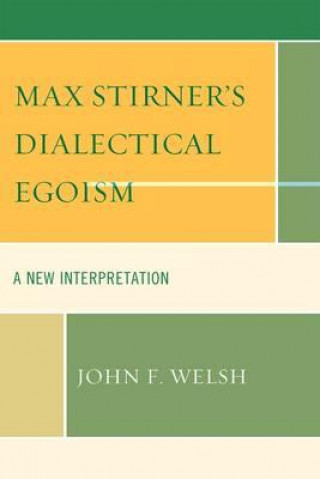
Kód: 04903496
Max Stirner's Dialectical Egoism
Autor John F. Welsh
Max Stirner (1806-1856) is recognized in the history of political thought because of his egoist classic The Ego and Its Own. Stirner was a student of Hegel, and a critic of the Young Hegelians and the emerging forms of socialist a ... celý popis
- Jazyk:
 Angličtina
Angličtina - Väzba: Pevná
- Počet strán: 304
Nakladateľ: Lexington Books, 2010
- Viac informácií o knihe

Mohlo by sa vám tiež páčiť
-

MetaMAUS
27.01 € -13 % -

This is Goya
22.46 € -

Walden
8.90 € -23 % -

Breaking Into Japanese Literature
19.12 € -13 % -

EVANGELIO DE PROMETEO,EL
27.11 € -

Lisan Al Arab Fi Masarib Al Adab Al Insha' Wal Rasa'il
34.70 €
Darujte túto knihu ešte dnes
- Objednajte knihu a vyberte Zaslať ako darček.
- Obratom obdržíte darovací poukaz na knihu, ktorý môžete ihneď odovzdať obdarovanému.
- Knihu zašleme na adresu obdarovaného, o nič sa nestaráte.
Viac informácií o knihe Max Stirner's Dialectical Egoism
Nákupom získate 462 bodov
 Anotácia knihy
Anotácia knihy
Max Stirner (1806-1856) is recognized in the history of political thought because of his egoist classic The Ego and Its Own. Stirner was a student of Hegel, and a critic of the Young Hegelians and the emerging forms of socialist and communist thought in the 1840s. Max Stirner's Dialectical Egoism: A New Interpretation examines Stirner's thought as a critique of modernity, by which he meant the domination of culture and politics by humanist ideology. In Stirner's view, "humanity" is the supreme being of modernity and "humanism" is the prevailing legitimation of social and political domination. Welsh traces Stirner's thought from his early essays to The Ego and Its Own and Stirner's responses to his critics. He also examines how Benjamin Tucker, James L. Walker, and Dora Marsden applied Stirner's dialectical egoism to the analysis of (a) the transformations of capitalism, (b) culture, ethics, and mass psychology, and (c) feminism, socialism, and communism. All three viewed Stirner as a champion of individuality against the collectivizing and homogenizing forces of the modern world. Welsh also takes great care to dissociate Stirner's thought from that of the other great egoist critic of modernity, Friedrich Nietzsche. He argues that the similarities in the dissidence of Stirner and Nietzsche are superficial. The book concludes with an interpretation of Stirner's thought as a form of dialectical egoism that includes (a) a multi-tiered analysis of culture, society, and individuality; (b) the basic principles of Stirner's view of the relationship between individuals and social organization; and (c) the forms of critique he employs. Stirner's critique of modernity is a significant contribution to the growing literature on libertarianism, dialectical analysis, and post-modernism.
 Parametre knihy
Parametre knihy
Zaradenie knihy Knihy po anglicky Society & social sciences Politics & government Political science & theory
184.68 €
- Celý názov: Max Stirner's Dialectical Egoism
- Podnázov: A New Interpretation
- Autor: John F. Welsh
- Jazyk:
 Angličtina
Angličtina - Väzba: Pevná
- Počet strán: 304
- EAN: 9780739141557
- ISBN: 0739141554
- ID: 04903496
- Nakladateľ: Lexington Books
- Hmotnosť: 612 g
- Rozmery: 158 × 232 × 21 mm
- Dátum vydania: 15. September 2010
Obľúbené z iného súdka
-

Postmodern Prince
42.49 € -

The Clash of Civilizations and the Remaking of World Order
11.93 € -10 % -

Prince
7.07 € -14 % -

Prince
7.78 € -9 % -

The Social Contract
8.29 € -3 % -

Strategy of Conflict
35.51 € -12 % -

Oxford Handbook of Modern Diplomacy
52.51 € -

On Tyranny
10.11 € -24 % -

Captive Mind
14.26 € -23 % -

Hope In The Dark
10.82 € -24 % -

Common Sense
11.02 € -23 % -

Analysis of Robert D. Putnam's Bowling Alone
9.10 € -4 % -

The Politics Book
22.15 € -13 % -

Anarchism and Other Essays
10.51 € -

How to Run A Government
13.15 € -16 % -

Administration of Fear
14.46 € -22 % -

Two Books of the Elements of Universal Jurisprudence
14.16 € -10 % -

Culture of National Security
49.98 € -

Open Conspiracy
29.54 € -4 % -

Conspiracy Theories
11.32 € -20 % -

Oxford Handbook of Political Economy
50.29 € -

Discourses on Livy
11.02 € -23 % -

Coup d'Etat
31.26 € -

Revolutions In Reverse: Essays On Politics, Violence, Art, And Imagination
17.50 € -23 % -

Communist Manifesto
12.84 € -21 % -

Analysis of Hans J. Morgenthau's Politics Among Nations
9.10 € -4 % -

Destined for War
20.13 € -22 % -

Dialectic of Enlightenment
31.16 € -

The Principles of Political Economy and Taxation
14.87 € -

Analysis of Max Weber's Politics as a Vocation
10.11 € -

Biggest Secret
20.03 € -11 % -

So You Want to Talk About Race
9.20 € -19 % -

Divided
11.02 € -23 % -

Rationalism in Politics & Other Essays
14.56 € -6 % -

Twenty-First Century Socialism
14.46 € -

Price of Inequality
14.46 € -24 % -

The Culture of Fear (Revised)
15.37 € -19 % -

Oxford Handbook of National Security Intelligence
78.01 € -

Retrotopia
21.44 € -

Machine Learning For Kids
28.43 € -19 % -

Bourgeois Equality
32.17 € -5 % -

Fashion and Politics
52.72 € -

Ronald Reagan
53.32 € -

Case for Nationalism
26.40 € -5 % -

States Versus Markets
53.12 € -

American Politics: A Very Short Introduction
11.43 € -19 % -

Prince - Special Edition with Machiavelli's Description of the Methods of Murder Adopted by Duke Valentino & the Life of Castruccio Castracani
14.87 € -

Chaos and Complexity Theory in World Politics
275.86 € -

Sovereignty
16.89 €
Osobný odber Bratislava a 2642 dalších
Copyright ©2008-24 najlacnejsie-knihy.sk Všetky práva vyhradenéSúkromieCookies



 21 miliónov titulov
21 miliónov titulov Vrátenie do mesiaca
Vrátenie do mesiaca 02/210 210 99 (8-15.30h)
02/210 210 99 (8-15.30h)